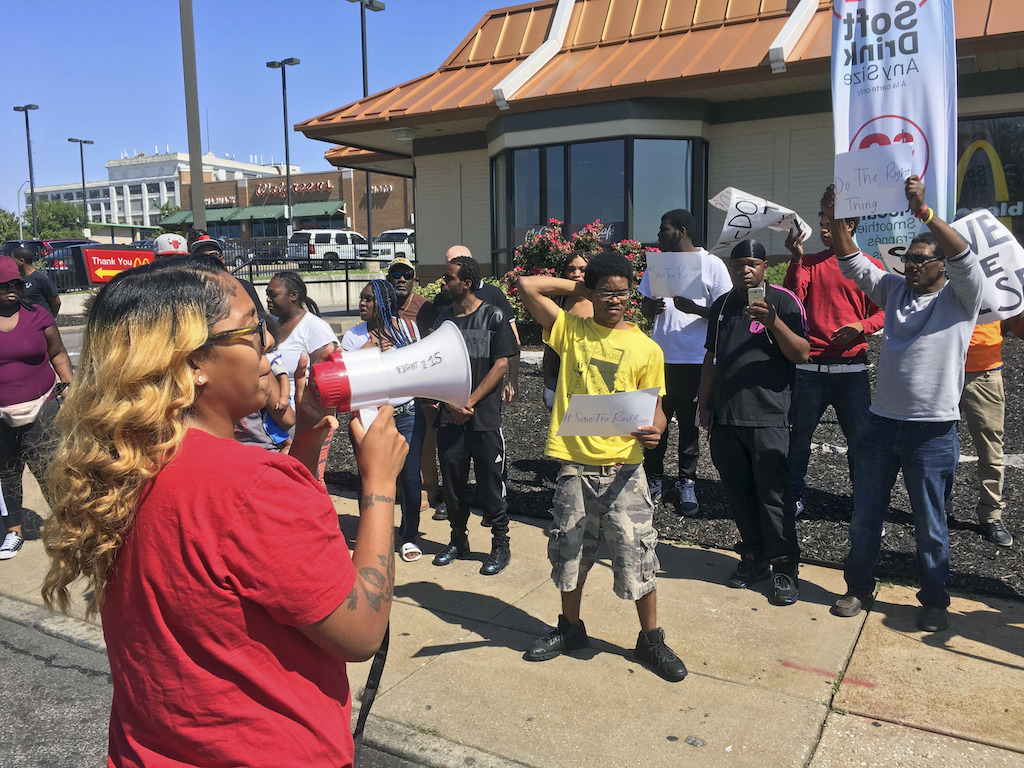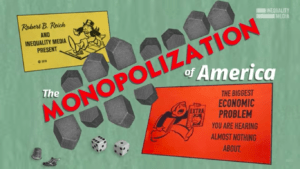Missouri Takes Away St. Louis’ Minimum Wage Hike
Legislators pre-empt an ordinance that would have gradually raised the local base pay from the state's level of $7.70 an hour to $11. Gennice Mackey leads a chant of "Save the Raise!" outside a McDonald's restaurant in St. Louis last week. (Jim Salter / AP)
Gennice Mackey leads a chant of "Save the Raise!" outside a McDonald's restaurant in St. Louis last week. (Jim Salter / AP)
In May, after St. Louis’ minimum wage rose to $10 per hour per city ordinance, Republican Missouri legislators backed by big-business lobbyists passed a law establishing a statewide minimum wage that could not be exceeded by cities, knocking the figure back down to $7.70. The change took effect Monday.
The city had passed an ordinance in 2015 that would gradually increase the minimum wage to $11. After two years of legal challenges failed, including one before the state Supreme Court, the Republican-dominated General Assembly passed a law limiting minimum wages statewide. An example of a “pre-emption law,” it effectively bends liberal urban centers to the will of conservative state lawmakers.
David Graham of The Atlantic writes:
There has been a major wave of state preemption laws around the country in recent years, the fruit of an era in which cities—even in traditionally conservative areas like the Deep South—are increasingly liberal, while conservative Republicans hold unprecedented control of state governments.
Progressives, finding themselves shut out at the state level, are attempting to enact new liberal policies in their home cities. And Republicans, who have long extolled the value of local control, have acted across the board to prevent them from doing so. The range of preemption laws is enormous, including culture-war issues like North Carolina’s controversial “bathroom bill,” HB2, in 2016, but many of them concern business interests. A city moves to ban hydraulic fracking or the use of plastic shopping bags or puppy mills or sugary drinks, and then the state smacks them down.
Minimum-wage laws are among the most common preemption laws. As the left-leaning Economic Policy Institute writes in a report released this weekend, 25 states have passed laws preempting local salary increases since 1999, more than half of them in the last five years.
Missouri Gov. Eric Greitens said in a statement, “Politicians in St. Louis passed a bill that fails on both counts: it will kill jobs, and despite what you hear from liberals, it will take money out of people’s pockets.”
According to The Associated Press:
Greitens declined to comment Monday but has said previously that the higher wage in St. Louis forces small businesses to either cut hours or cut jobs. He cited a University of Washington study suggesting Seattle’s $15 minimum wage cost workers hours on the job, resulting in an average loss of $125 per month.
Another study by the University of California at Berkeley had a different result, finding that the Seattle wage hike boosted pay for restaurant workers without costing jobs.
Some found it ironic that the state’s move comes as St. Louis police officers have been awarded a 30 to 40 percent pay raise generated by a sales tax increase, part of which was slated for social services within the community. Never mind that a 2015 Justice Department report raised concerns about racial profiling by the city’s police after the controversial killing of black 18-year-old Mansur Ball-Bey. An autopsy showed Ball-Bey was shot in the back, contradicting police claims, yet no charges were brought in the case.
The Riverfront Times noted:
Representing 1,100 city cops, the St. Louis Police Officers Association is in the midst of contract negotiations with the city, and its controversial business manager, Jeff Roorda, has spent months proclaiming that an insufficient salary increase will create a “dire” shortage of officers. Roorda and the union were also not at all pleased that the city earmarked a chunk of potential revenue from a proposed sales tax increase to fund such things as after-school groups, social workers and mental health treatment, a.k.a. “programs unrelated to police pay.”
Activist groups such as Save the Raise denounced the state’s action and vowed to fight on, while national labor group Fight for $15 called the decrease disgusting. Some politicians, including St. Louis Mayor Lyda Krewson and Columbia, Mo., Mayor Brian Treece, are taking up the fight, according to the Columbia Tribune:
Krewson said she’ll be asking for signatures on a petition toward a November 2018 ballot measure. The effort called “Raise Up Missouri” requires 100,000 signatures by May. Treece and officials from St. Louis County and Kansas City also support the effort.
Opponents of the law are fighting back in other ways as well.
The Los Angeles Times reports that “more than 100 small businesses have pledged not to cut paychecks, and 16 members of the St. Louis Board of Aldermen endorsed the campaign.”
Your support matters…Independent journalism is under threat and overshadowed by heavily funded mainstream media.
You can help level the playing field. Become a member.
Your tax-deductible contribution keeps us digging beneath the headlines to give you thought-provoking, investigative reporting and analysis that unearths what's really happening- without compromise.
Give today to support our courageous, independent journalists.









You need to be a supporter to comment.
There are currently no responses to this article.
Be the first to respond.